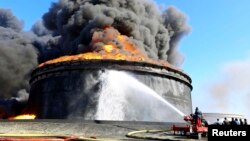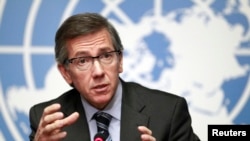Efforts by the U-N Secretary-General’s special representative Bernardino Leon to negotiate a deal to end Libya’s protracted violence stalled last week when a remnant government that occupies the capital, Tripoli, refused to attend talks in Geneva.
Rival militias have displaced thousands of civilians from major cities in recent months. Embassies in the capital have been abandoned. An internationally-recognized House of Representatives meets in a hotel in the distant port of Tobruk. In early January, Turkish Airlines shut down the last foreign flights to the country. The second-largest city, Benghazi, is a battleground. Militias have destroyed oil storage tanks with rockets. Libya’s representative to the Organization of the Petroleum Exporting Countries (OPEC) was kidnapped last week by masked gunmen. The government of Prime Minister Abdullah al-Thanni fired on a Greek tanker in a Libyan port under militia control.
Libya’s divisions over tribe, politics and the revenues from the nation’s floundering oil production have created multiple militias and two competing governments. The conflict has now given birth to two competing national oil corporations, further complicating efforts by the United Nations to broker a ceasefire and a national dialogue to put Libya back together again.
Africa’s largest oil reserves
Libya holds the largest oil reserves in Africa, and in good times has produced up to 1.6 million barrels of oil per day. Since its militia wars began, however, daily production has dropped as low as 200,000 barrels.
“A significant factor there is who is controlling the pipelines on the way from the oil fields to the port,” says Padraig O’Hannelly, managing editor of the UK-based Libya Business News. “So, the pipelines and the pumping stations and so forth are under the control of various local militias and they need to be placated in order to get the oil to where it needs to be.
“And over time, agreements are reached and so on and the lines are switched on again and at other times they are switched off. So, those sorts of factors are significant in terms of the total Libyan oil production.”
Libya has two major regions of oil production: Oil drilled from the vast El Sharara fields in the southwest is piped directly north to Mediterranean facilities near Tripoli. Another complex system of pipelines delivers oil from northeastern fields to Mediterranean ports near Benghazi or to Tobruk, close to the Egyptian border. All lines pass through tribal lands.
The pipeline cut-offs didn’t start with clashes between the militia forces now in control of Tripoli, or with the withdrawal of the legislature to the port of Tobruk, or when the prime minister moved his cabinet to nearby Bayda. The cut-offs started during the long reign of Muammar Gadhafi.
“The tribal rivalries and the fact that it is still going on is part of the reason why we have the conflict in the country at the moment,” said O’Hannelly.
Keeping Libya’s oil business running has been the job of the National Oil Corporation, an agency reputed to be independent of Libyan politics. Prime Minister Abdullah al-Thanni recently renewed his pledge that the corporation would rise above the nation’s political conflicts.
Rival national oil corporations, one central bank
“The difficulty there is in terms of determining what exactly is the national oil corporation at the moment,” said O’Hannelly. “Two people are effectively running two parallel national oil corporations. They were both appointed by the prime minister, al-Thanni. But Mustafa Sanallah was seen as a little bit too close to the rival regime, which is the remnants of the General National Council in Tripoli. and he was replaced at the end of last year by Mabrook Buseif who was appointed by al-Thanni to run effectively the National Oil Corporation .
“The difficulty is he doesn’t have access to the headquarters in Tripoli. Effectively he’s trying to run a parallel organization through the ministry of oil and gas of the internationally recognized government that’s being run by the House of Representatives.”
The remnant legislature and its Libya Dawn forces – a combination of Islamists and militia from the Misrata region – have the upper hand with control of all government offices in the capital, Tripoli. “It may be a little simplistic to put it in these terms but effectively, they control the oil that’s coming from the west of the country, whereas the government of al-Thanni is controlling the oil that comes from the east of the country.
“But just to complicate things further,” said O’Hannelly, “the payments for the oil are then coming back to the Central Bank, which is also in Tripoli.”
During last week’s talks in Geneva, the Central Bank – which reportedly holds in excess of $100 billion in foreign reserves from oil exports - discussed its concerns about lost oil revenues. The bank also has proposed cuts in government spending and services.
The troubles of Libya’s oil industry are of great concern for many international companies who buy Libyan crude, such as Italy’s ENI, the French company, TOTAL, and Spain’s Repsol.
Libya’s leaders are also concerned. They worry about the nation’s shrinking oil revenues and who will get them.
“It’s believed at the moment that al-Thanni is trying to set up a parallel payment structure there that would enable payment to be made into his administration independently of the Central Bank,” O’Hannelly said.
Prospects for settlement grow dim
The primary focus of the Geneva talks is ending the conflict. The goal is uniting Libyans. Will the militias and the governments and the oil corporations return to Geneva any time soon? Can they become one country again?
“That’s very difficult to say,” said O’Hannelly. Oil is the nation’s big export but tribalism could trump economic interests. “I mean, the differences between the two administrations obviously go deeper than just the issue of the oil and it’s (the country’s) revenues from oil.
“I mean, clearly that’s a big factor in what’s involved here but you have to remember, as well, that the tribal differences in Libya run deep and they go back over a long period.
“So any agreement that’s reached in Geneva is going to have to placate all sides and that’s not an easy task. “
Recent fluctuations in Libya’s oil production have played a role in lowering world oil prices, according to O’Hannelly. But the future of the local oil industry and resolution of the nation’s political chaos appears still to be dictated by tribal interests of the Gadhafi era.






